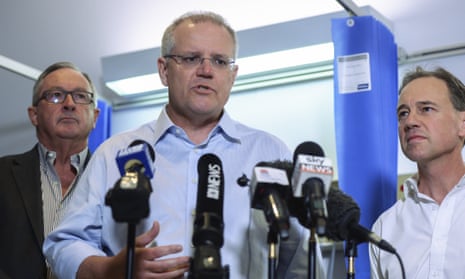The federal government has commissioned an inquiry into mental illness and its impact on the economy, saying it wants to know whether Australia’s mental health funding is delivering the best possible outcomes.
The government has asked the Productivity Commission to investigate the issue in an 18-month inquiry to begin later this month.
Labor has welcomed the review but says it should not be used by the prime minister, Scott Morrison, to delay reforms needed now.
It has also questioned why it has been announced now, when Prof Allan Fels, the former National Mental Health Commission chairman, called for it almost 18 months ago.
The Coalition government says mental health challenges can have a devastating personal impact on Australians, affecting people’s employment and productivity, income, living standards, physical wellbeing and social connectedness.
It says mental health also affects businesses, the hospital system and social services, and therefore has a large effect on Australia’s economy.
The treasurer, Josh Frydenberg, and the health minister, Greg Hunt, have asked the Productivity Commission to provide recommendations on the best ways to improve the social and economic participation of Australians struggling with their mental health.
The federal government will spend roughly $4.7bn this year on mental health. Once state and territory government funding is taken into account, the investment in mental health rises to $9bn per year.
“It is crucial that we know that this funding is delivering the best possible outcomes for individuals and their families, and that is one of the issues the inquiry will investigate,” Frydenberg said on Sunday.
Hunt said he had consulted state and territory health and mental health ministers to seek their views on inquiry’s terms of reference.
“Every year around 4 million Australians deal with some form of chronic or episodic mental health condition,” he said. “Sadly, one in five Australians affected by mental illness do not seek help because of stigma.”
The Productivity Commission will hold hearings in regional areas as part of its inquiry.
Labor has welcomed the review but it has questioned the government’s commitment to the issue.
Julie Collins, the shadow minister for mental health, and Deborah O’Neill, the shadow assistant minister for mental health, say the Morrison government could immediately adopt the National Mental Health Commission’s target to reduce suicide by 50% over 10 years.
In a joint statement on Sunday, they said last month’s Bureau of Statistics data revealed 3,128 Australians died by suicide in 2017, an increase of 262 deaths from the previous year.
“These statistics are a stark reminder of the work that needs to be done to address this serious national issue,” they said. “Too often the Abbott-Turnbull-Morrison government has played catch-up in this vital area of policy.
“It took almost a year of Labor publicly calling on the Liberal government to extend the suicide prevention trial sites before it finally announced it would do so.
“[And] the minister for health is yet to deliver on his promise to deliver a comprehensive plan for specific treatment for Australians who are living with eating disorders.”
In his address to the National Press Club on 5 August 2015, Fels, the then chairman of the National Mental Health Commission, emphasised the economic costs of mental ill-health to Australia.
“As an economist, I want to emphasise that mental health is a significant problem for our economy – as significant as, often more significant than, tax or microeconomic reform,” he said. “Many people do not get the support they need and governments get poor returns on substantial investment.
“The economic or GDP gains from better mental health would dwarf most of the gains – often modest ones – being talked about in current economic reform debates.”
He then said the commission had found that the economic cost of mental ill-health was enormous.
“Estimates range up to $28.6bn a year in direct and indirect costs, with lost productivity and job turnover costing a further $12bn a year – collectively $40bn a year, or more than two per cent of GDP,” he said.
